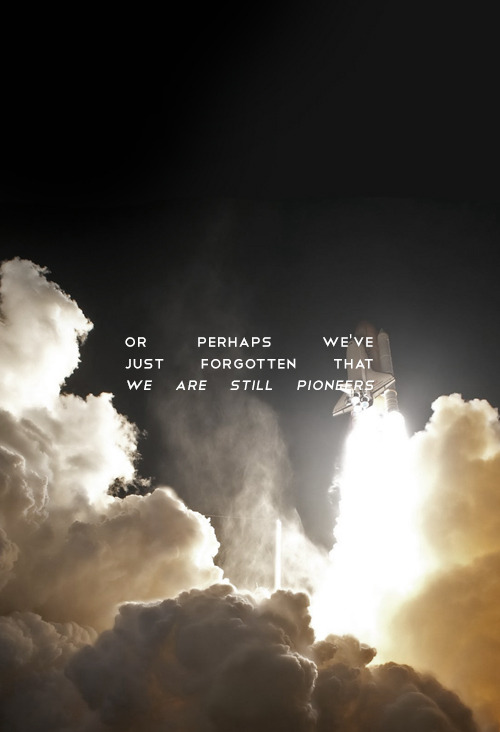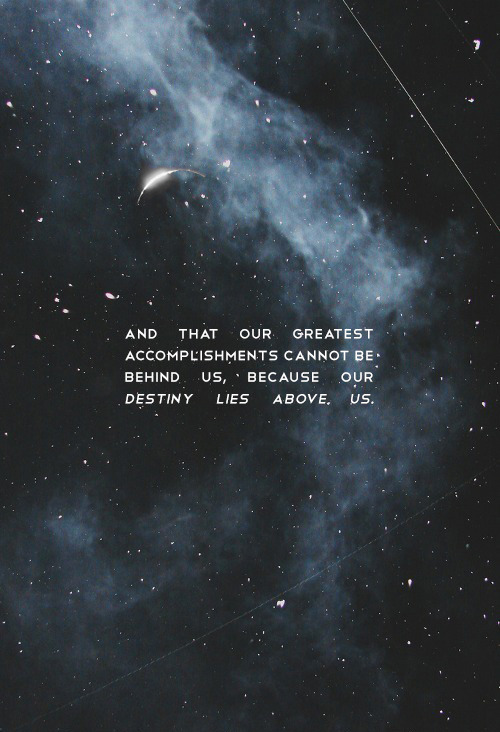Exercising In Space – Quick Video About My Favorite Fitness Machine
Exercising in space – Quick video about my favorite fitness machine
#Fitness is critical in space! Watch this #SpeedyTime video as I transform the multi-modal ARED machine during my workout. The Advanced Resistive Exercise Device (ARED), simulates free-weight exercises in normal gravity. In space we exercise 2 hours every day in order to maintain our muscle and bone mass. Our favorite part about exercising in space is of course, the view!
To learn more about the ARED, please visit https://www.nasa.gov/mission_pages/station/research/experiments/1001.html
More Posts from Scenesofspace and Others


Today NASA released parts of the set of highest-resolution pictures of Pluto from the New Horizons probe’s fly-by in July. As they write, “these latest images form a strip 50 miles (80 kilometers) wide on a world 3 billion miles away.” Imagine that. They are also the highest resolution images we’ll have of Pluto in a long, long time.
This picture, a crop, shows Sputnik Planum and the al-Idrisi mountains, which are made of big chunks of water ice. Be sure to check out the whole thing.
Space Probes
The Spaceprob.es site tracks the active probes in operation in and around our solar system, from Voyager I (19.56 billion km from Earth) to the Artemis probes (358,000 km away). (via @BadAstronomer)
Space Robot Roll Call
Emily Lakdawalla of the Planetary Society filed a report on humanity’s current roster of spacecraft currently exploring the solar system (and beyond).
Chang'e-4 and Yutu-2 are now past their prime mission and are in their extended mission phases. Their companion SmallSat, Longjiang-2, will crash into the Moon on 31 July to bring its mission to an intentional end. Parker Solar Probe is near aphelion as of 1 July and will reach its third death-defying solar perihelion on 1 September. BepiColombo completed its near-Earth commissioning phase on 5 April and is now settling into its long-cruise phase. Earlier this year, the ESA-JAXA Mercury mission was racing ahead of Earth on an inside track, but its elliptical orbit has now taken it farther from the Sun than Earth, allowing Earth to catch up. It will return to Earth’s neighborhood in April 2020 for a flyby.
I counted roughly 30 different probes and rovers in operation, most of them gathered around the Moon and Mars. Sure, where’s my jetpack and flying car and all that, but the fact that humanity has more than two dozen robots currently exploring the solar system seems pretty futuristic to me.
Wikipedia also has a page listing currently active probes and of course there’s the lovely & informative spaceprob.es as well.

Phobos
The leisurely pace of light speed
In a 45-minute video called Riding Light, Alphonse Swinehart animates the journey outward from the Sun to Jupiter from the perspective of a photon of light. The video underscores just how slow light is in comparison to the vast distances it has to cover, even within our own solar system. Light takes 8.5 minutes to travel from the Sun to the Earth, almost 45 minutes to Jupiter, more than 4 years to the nearest star, 100,000 years to the center of our galaxy, 2.5 million years to the nearest large galaxy (Andromeda), and 32 billion years to reach the most remote galaxy ever observed.1 The music is by Steve Reich (Music for 18 Musicians), whose music can also seem sort of endless.
If you’re impatient, you can watch this 3-minute version, sped up by 15 times:
This isn’t strictly true. As I understand it, a photon that just left the Sun will never reach that most remote galaxy.↩




The last shuttle

Sunset On Pluto
via reddit
50 Lovingly Restored Photographs of the Earth Taken by Apollo Astronauts
For his Earth Restored project, Toby Ord digitally remastered 50 photographs of the whole Earth taken by Apollo astronauts during their missions in the 60s and 70s.
The Apollo photographs are historic works of art. So in restoring them, I sought to bring out their own beauty. I refrained from recomposing the images by cropping, or trying to leave my own mark or interpretation. Perhaps in some cases this would make a more pleasing image, but it was not my aim.
And the Apollo photographs are also a scientific record of what our Earth looks like. In particular, what it would have looked like from the perspective of the astronaut taking the shot. So rather than pumping the saturation or adjusting the colours to what we think the Earth looks like, I wanted to allow us to learn from these photographs something about how it actually appears.
Many of these shots are new to me – the Apollo program and its scientific and cultural output continue to be revelatory 50 years later. (My only quibble here: the images on the website are not high-res. Would love to see much bigger versions of these.)










Ode to Apollo 11 and the joy of discovery
-
 gooddiscworldomens liked this · 4 years ago
gooddiscworldomens liked this · 4 years ago -
 alyssanicoleguajardo-blog reblogged this · 5 years ago
alyssanicoleguajardo-blog reblogged this · 5 years ago -
 vanillatumbleweedscoffee liked this · 5 years ago
vanillatumbleweedscoffee liked this · 5 years ago -
 kikipham liked this · 6 years ago
kikipham liked this · 6 years ago -
 kikipham reblogged this · 6 years ago
kikipham reblogged this · 6 years ago -
 linerle liked this · 6 years ago
linerle liked this · 6 years ago -
 impossibletriumphcandy-blog liked this · 6 years ago
impossibletriumphcandy-blog liked this · 6 years ago -
 riscrivendo liked this · 6 years ago
riscrivendo liked this · 6 years ago -
 silkworm0 liked this · 6 years ago
silkworm0 liked this · 6 years ago -
 jerrywilliamsdavid liked this · 6 years ago
jerrywilliamsdavid liked this · 6 years ago -
 mycosect liked this · 7 years ago
mycosect liked this · 7 years ago -
 yassous reblogged this · 7 years ago
yassous reblogged this · 7 years ago -
 yassous liked this · 7 years ago
yassous liked this · 7 years ago -
 phasma-first-order reblogged this · 7 years ago
phasma-first-order reblogged this · 7 years ago -
 phasma-first-order liked this · 7 years ago
phasma-first-order liked this · 7 years ago -
 fhrb1 reblogged this · 7 years ago
fhrb1 reblogged this · 7 years ago -
 samisaramaki liked this · 7 years ago
samisaramaki liked this · 7 years ago -
 leoxymoron reblogged this · 7 years ago
leoxymoron reblogged this · 7 years ago -
 basketgays liked this · 7 years ago
basketgays liked this · 7 years ago -
 cullenski reblogged this · 7 years ago
cullenski reblogged this · 7 years ago -
 cullenski liked this · 7 years ago
cullenski liked this · 7 years ago -
 officialandromeda reblogged this · 7 years ago
officialandromeda reblogged this · 7 years ago -
 staceghost liked this · 7 years ago
staceghost liked this · 7 years ago -
 goldkirk liked this · 7 years ago
goldkirk liked this · 7 years ago -
 sonofgaia144-blog liked this · 7 years ago
sonofgaia144-blog liked this · 7 years ago -
 viciouslydull reblogged this · 7 years ago
viciouslydull reblogged this · 7 years ago -
 inkcupsandgrommets liked this · 7 years ago
inkcupsandgrommets liked this · 7 years ago -
 al-not-ai reblogged this · 7 years ago
al-not-ai reblogged this · 7 years ago -
 afrodita-niculescu-blog liked this · 7 years ago
afrodita-niculescu-blog liked this · 7 years ago -
 rainbowexoticmusic-blog reblogged this · 7 years ago
rainbowexoticmusic-blog reblogged this · 7 years ago -
 diario-de-una-artista reblogged this · 7 years ago
diario-de-una-artista reblogged this · 7 years ago -
 spacemedicine-blog1 reblogged this · 7 years ago
spacemedicine-blog1 reblogged this · 7 years ago -
 spacemedicine-blog1 reblogged this · 7 years ago
spacemedicine-blog1 reblogged this · 7 years ago -
 spacemedicine-blog1 liked this · 7 years ago
spacemedicine-blog1 liked this · 7 years ago -
 yulyashka reblogged this · 7 years ago
yulyashka reblogged this · 7 years ago